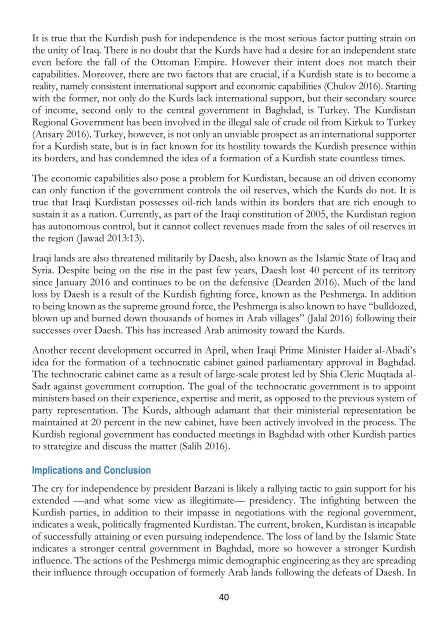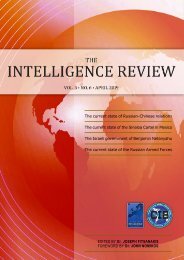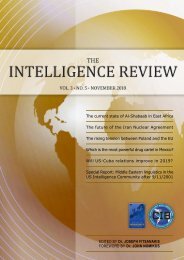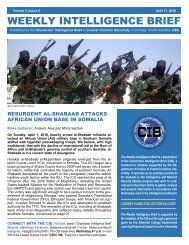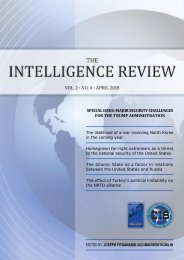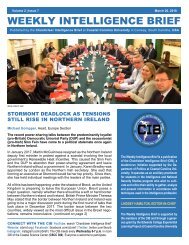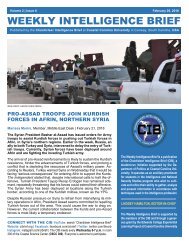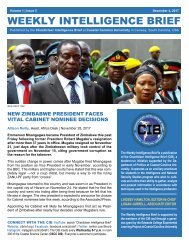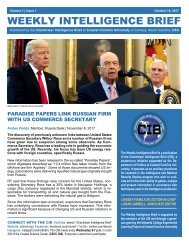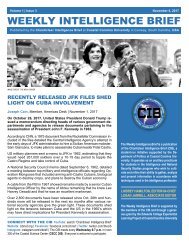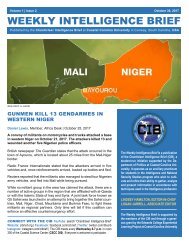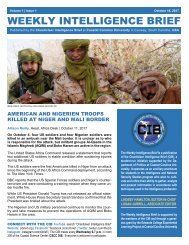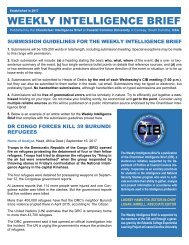The Intelligence Review | volume 1 | issue 1
This volume is the product of a collaboration between the European Intelligence Academy (EIA) and the Chanticleer Intelligence Brief (CIB), a student-run initiative supported by the Department of Politics at Coastal Carolina University in Conway, South Carolina, United States. Eleven CIB analysts tackle some of the most pressing and timely questions confronting intelligence observers today. Topics range from the price of oil to political stability in Venezuela, from the territorial cohesion of Iraq to the future of the Islamic State, and many other pressing subjects that feature daily in news headlines. CIB analysts propose carefully crafted and informed forecasts that outline future developments in some of the world's most unpredictable hot spots.
This volume is the product of a collaboration between the European Intelligence Academy (EIA) and the Chanticleer Intelligence Brief (CIB), a student-run initiative supported by the Department of Politics at Coastal Carolina University in Conway, South Carolina, United States. Eleven CIB analysts tackle some of the most pressing and timely questions confronting intelligence observers today. Topics range from the price of oil to political stability in Venezuela, from the territorial cohesion of Iraq to the future of the Islamic State, and many other pressing subjects that feature daily in news headlines. CIB analysts propose carefully crafted and informed forecasts that outline future developments in some of the world's most unpredictable hot spots.
Create successful ePaper yourself
Turn your PDF publications into a flip-book with our unique Google optimized e-Paper software.
It is true that the Kurdish push for independence is the most serious factor putting strain on<br />
the unity of Iraq. <strong>The</strong>re is no doubt that the Kurds have had a desire for an independent state<br />
even before the fall of the Ottoman Empire. However their intent does not match their<br />
capabilities. Moreover, there are two factors that are crucial, if a Kurdish state is to become a<br />
reality, namely consistent international support and economic capabilities (Chulov 2016). Starting<br />
with the former, not only do the Kurds lack international support, but their secondary source<br />
of income, second only to the central government in Baghdad, is Turkey. <strong>The</strong> Kurdistan<br />
Regional Government has been involved in the illegal sale of crude oil from Kirkuk to Turkey<br />
(Ansary 2016). Turkey, however, is not only an unviable prospect as an international supporter<br />
for a Kurdish state, but is in fact known for its hostility towards the Kurdish presence within<br />
its borders, and has condemned the idea of a formation of a Kurdish state countless times.<br />
<strong>The</strong> economic capabilities also pose a problem for Kurdistan, because an oil driven economy<br />
can only function if the government controls the oil reserves, which the Kurds do not. It is<br />
true that Iraqi Kurdistan possesses oil-rich lands within its borders that are rich enough to<br />
sustain it as a nation. Currently, as part of the Iraqi constitution of 2005, the Kurdistan region<br />
has autonomous control, but it cannot collect revenues made from the sales of oil reserves in<br />
the region (Jawad 2013:13).<br />
Iraqi lands are also threatened militarily by Daesh, also known as the Islamic State of Iraq and<br />
Syria. Despite being on the rise in the past few years, Daesh lost 40 percent of its territory<br />
since January 2016 and continues to be on the defensive (Dearden 2016). Much of the land<br />
loss by Daesh is a result of the Kurdish fighting force, known as the Peshmerga. In addition<br />
to being known as the supreme ground force, the Peshmerga is also known to have “bulldozed,<br />
blown up and burned down thousands of homes in Arab villages” (Jalal 2016) following their<br />
successes over Daesh. This has increased Arab animosity toward the Kurds.<br />
Another recent development occurred in April, when Iraqi Prime Minister Haider al-Abadi’s<br />
idea for the formation of a technocratic cabinet gained parliamentary approval in Baghdad.<br />
<strong>The</strong> technocratic cabinet came as a result of large-scale protest led by Shia Cleric Muqtada al-<br />
Sadr against government corruption. <strong>The</strong> goal of the technocratic government is to appoint<br />
ministers based on their experience, expertise and merit, as opposed to the previous system of<br />
party representation. <strong>The</strong> Kurds, although adamant that their ministerial representation be<br />
maintained at 20 percent in the new cabinet, have been actively involved in the process. <strong>The</strong><br />
Kurdish regional government has conducted meetings in Baghdad with other Kurdish parties<br />
to strategize and discuss the matter (Salih 2016).<br />
Implications and Conclusion<br />
<strong>The</strong> cry for independence by president Barzani is likely a rallying tactic to gain support for his<br />
extended —and what some view as illegitimate— presidency. <strong>The</strong> infighting between the<br />
Kurdish parties, in addition to their impasse in negotiations with the regional government,<br />
indicates a weak, politically fragmented Kurdistan. <strong>The</strong> current, broken, Kurdistan is incapable<br />
of successfully attaining or even pursuing independence. <strong>The</strong> loss of land by the Islamic State<br />
indicates a stronger central government in Baghdad, more so however a stronger Kurdish<br />
influence. <strong>The</strong> actions of the Peshmerga mimic demographic engineering as they are spreading<br />
their influence through occupation of formerly Arab lands following the defeats of Daesh. In<br />
40


